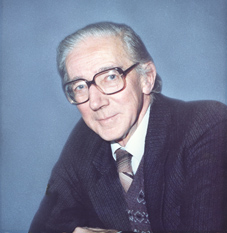External links
"Lambert of Auxerre" entry by Sara L. Uckelman in the Stanford Encyclopedia of Philosophy
Lambert of Auxerre was a medieval 13th century logician best known for writing the book "Summa Lamberti" or simply "Logica" [1] in the mid 1250s which became an authoritative textbook on logic in the Western tradition. [2] He was a Dominican in the Dominican house at Auxerre. His contemporaries were Peter of Spain, William of Sherwood, and Roger Bacon. [3]
"Lambert of Auxerre" entry by Sara L. Uckelman in the Stanford Encyclopedia of Philosophy

William of Ockham or Occam was an English Franciscan friar, scholastic philosopher, apologist, and Catholic theologian, who is believed to have been born in Ockham, a small village in Surrey. He is considered to be one of the major figures of medieval thought and was at the centre of the major intellectual and political controversies of the 14th century. He is commonly known for Occam's razor, the methodological principle that bears his name, and also produced significant works on logic, physics and theology. William is remembered in the Church of England with a commemoration on the 10th of April.

Scholasticism was a medieval school of philosophy that employed a critical organic method of philosophical analysis predicated upon the Aristotelian 10 Categories. Christian scholasticism emerged within the monastic schools that translated scholastic Judeo-Islamic philosophies, and thereby "rediscovered" the collected works of Aristotle. Endeavoring to harmonize his metaphysics and its account of a prime mover with the Latin Catholic dogmatic trinitarian theology, these monastic schools became the basis of the earliest European medieval universities, contributing to the development of modern science; scholasticism dominated education in Europe from about 1100 to 1700. The rise of scholasticism was closely associated with these schools that flourished in Italy, France, Portugal, Spain and England.
The Summa Logicae is a textbook on logic by William of Ockham. It was written around 1323.

Robert Kilwardby was an Archbishop of Canterbury in England and a cardinal. Kilwardby was the first member of a mendicant order to attain a high ecclesiastical office in the English Church.
Ernest Addison Moody (1903–1975) was a noted philosopher, medievalist, and logician as well as a musician and scientist. He served as professor of philosophy at University of California, Los Angeles (UCLA), where he also served as department chair, and Columbia University. He has an annual memorial conference in his name on the subject of medieval philosophy. He was president of the American Philosophical Association from 1963 to 1964.

Gilbert de la Porrée, also known as Gilbert of Poitiers, Gilbertus Porretanus or Pictaviensis, was a scholastic logician and theologian and Bishop of Poitiers.
The Modistae, also known as the speculative grammarians, were the members of a school of grammarian philosophy known as Modism or speculative grammar, active in northern France, Germany, England, and Denmark in the 13th and 14th centuries. Their influence was felt much less in the southern part of Europe, where the somewhat opposing tradition of the so-called "pedagogical grammar" never lost its preponderance.

Paul of Venice was a Catholic philosopher, theologian, logician and metaphysician of the Order of Saint Augustine.
William of Sherwood or William Sherwood, with numerous variant spellings, was a medieval English scholastic philosopher, logician, and teacher. Little is known of his life, but he is thought to have studied in Paris, was a master at Oxford in 1252, treasurer of Lincoln from 1254/1258 onwards, and a rector of Aylesbury.
The history of logic as a subject has been characterised by many disputes over what the topic deals with, and the main article 'Logic' has as a result been hesitant to commit to a particular definition of logic. This article surveys various definitions of the subject that have appeared over the centuries through to modern times, and puts them in context as reflecting rival conceptions of the subject.
Boetius de Dacia, OP was a 13th-century Danish philosopher.
John of Dumbleton was a member of the Dumbleton village community in Gloucestershire, a southwestern county in England. Although obscure, he is considered a significant English fourteenth-century philosopher for his contributions to logic, natural philosophy, and physics. Dumbleton’s masterwork is his Summa Logicae et Philosophiae Naturalis, likely to have been composed just before the time of his death.

Brian Evan Anthony Davies is a British philosopher, Roman Catholic priest, and friar. He is Distinguished Professor of Philosophy, Fordham University, and author of An Introduction to the Philosophy of Religion, now in its fourth English edition, which has been translated into five languages.
In the history of logic, the term logica nova refers to a subdivision of the logical tradition of Western Europe, as it existed around the middle of the twelfth century. The Logica vetus referred to works of Aristotle that had long been known and studied in the Latin West, whereas the Logica nova referred to forms of logic derived from Aristotle's works which had been unavailable until they were translated by James of Venice in the 12th century. Study of the Logica nova was part of the Renaissance of the 12th century.

George Edward Hughes was an Irish-born New Zealand philosopher and logician whose principal scholarly works were concerned with modal logic and medieval philosophy.
Jan Pinborg (1937–1982) was a renowned historian of medieval linguistics and philosophy of language, and the most famous member of the Copenhagen School of Medieval Philosophy pioneered by Heinrich Roos in the 1940s. Pinborg was a pupil of Roos.
Hermannus Alemannus translated Arabic philosophical works into Latin. He worked at the Toledo School of Translators around the middle of the thirteenth century and is almost certainly to be identified with the Hermannus who was bishop of Astorga in León from 1266 until his death in 1272.

Medieval philosophy is the philosophy that existed through the Middle Ages, the period roughly extending from the fall of the Western Roman Empire in the 5th century until after the Renaissance in the 13th and 14th centuries. Medieval philosophy, understood as a project of independent philosophical inquiry, began in Baghdad, in the middle of the 8th century, and in France and Germany, in the itinerant court of Charlemagne in Aachen, in the last quarter of the 8th century. It is defined partly by the process of rediscovering the ancient culture developed in Greece and Rome during the Classical period, and partly by the need to address theological problems and to integrate sacred doctrine with secular learning. This is one of the defining characteristics in this time period. Understanding God was the focal point of study of the philosophers at that time, Muslim and Christian alike.
Eleonore Stump is an American philosopher and the Robert J. Henle Professor of Philosophy at Saint Louis University, where she has taught since 1992.
The Summa Grammatica was one of the earlier works on Latin grammar and Aristotelian logic by the medieval English philosopher Roger Bacon. It is primarily noteworthy for its exposition of a kind of universal grammar.